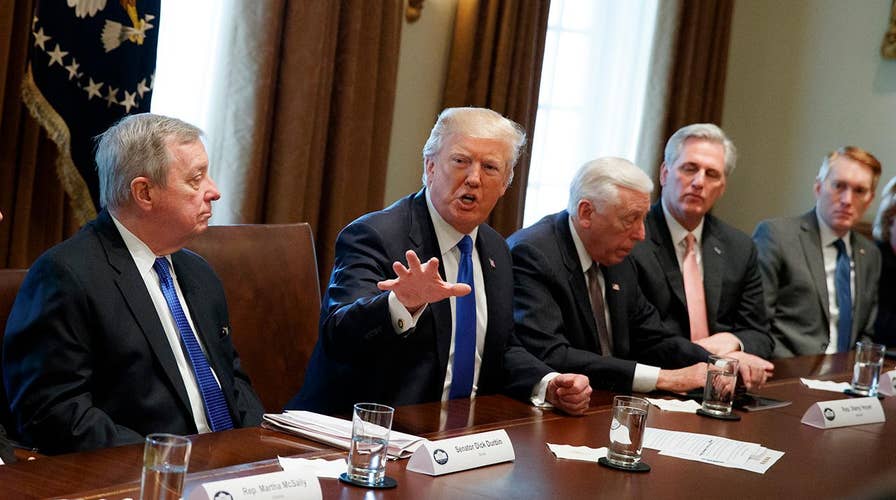Trump displays deal-making skills in immigration meeting
Strategists Jen Kerns and Chuck Rocha debate on 'Fox & Friends First.'
President Trump and his administration are being unfairly criticized for concluding that a program called Temporary Protected Status (TPS) that has allowed 200,000 citizens of El Salvador to legally remain in the U.S. since 2001 is just what its name says – temporary.
Predictably, when the Trump administration announced earlier this month that TPS for the Salvadorans would end in 2019, the left and mainstream media erupted. They contended, in effect, that the president should act without congressional authorization to make what was always intended to be a temporary program permanent.
The Nation published an article headlined: “Trump to 200,000 Salvadoran Immigrants: Drop Dead.” Sen. Tom Carper, D-Del., tweeted that the President Trump’s decision “breaks with our country’s moral obligation to care for our neighbors.”
In fact, the president made the right decision, in accordance with federal law. A big reason the American people elected him in 2016 was because he promised to get control of our immigration system as a key part of his America First agenda.
President Trump is following the law. He understands that his most important job is to protect our national security and the safety, jobs and economic security of the American people. Improving border security is a vital step in achieving these goals.
President Trump recognized that past administrations allowed a lawless and mostly open border, and enshrined into law an inane “chain migration” model” that compromises America’s economic and national security.
Chain migration allows immigrants with legal status to bring spouses and minor children to the U.S., and then permits the immigrants to petition to bring in other relatives once they become U.S. citizens. As a result, naturalized citizens can bring their adult siblings, adult children, and the spouses and children of their adult children.
A quick history lesson: Congress passed a law creating TPS in 1990 to allow foreign nationals to remain in the United States temporarily if they’re unable to safely return home because of extreme circumstances, such as war or natural disasters. This is why it was named the Temporary Protected Status program. Congress could have chosen to create a program for permanent protected status leading to American citizenship, but it did not.
In 2001 El Salvador was devastated by earthquakes. With the country in shambles, TPS was granted to the approximately 200,000 El Salvadorans already in the U.S. at that time.
Yes, you read that right. These Salvadorans are not – contrary to popular belief – refugees who fled a disaster. Instead, they were already in the United States when the earthquakes struck and devastated their homeland. Most media reports have badly distorted the actual history of what happened.
Out of great compassion, the U.S. agreed to temporarily allow these people to remain in our country, even though many – if not most – of them were here illegally and would otherwise be eligible for deportation.
Such a reprieve represents the best of America – a country with heart and generosity for our Latin American neighbor and the plight of these people. The whole point of TPS, however, is to provide a temporary protection – not a lifelong free pass.
Can anyone reasonably argue that 17 years is not a sufficient amount of time for any country to recover from a natural disaster?
Another question I’d place before critics of this policy move: why should Salvadorans, particularly the ones who were here illegally in the first place, receive lifetime legal status in the United States when millions of other applicants wait patiently in line for permission to become Americans?
I do not believe that a disaster in the homeland of the Salvadorans, as unfortunate as the devastation was, merits a perpetual permit to remain in our country.
In announcing that TPS for the Salvadorans will end next year, Homeland Security Secretary Kirstjen Nielsen made a sound judgement in accordance with the law creating the temporary program. As a statement issued by her department said, “the Secretary determined that the original conditions caused by the 2001 earthquakes no longer exist.”
It’s high time we regain control over immigration. President Trump deserves enormous credit for the plunge in illegal crossings at our southern border. Now we must complete the task of securing that border with a wall, something President Trump should trade in exchange for protecting DACA recipients.
DACA (Deferred Action for Childhood Arrivals) temporarily allows about 700,000 illegal immigrants brought to the U.S. illegally by their parents to stay here with legal status, but was never approved by Congress. Instead, President Obama created the temporary program by executive order.
President Trump has given Congress until March to pass legislation protecting the DACA recipients, but has sensibly insisted that funding for a border wall and increased border security be included in that legislation, along with an end to chain migration and termination of a diversity visa lottery program. The lottery program gives 50,000 immigrant visas annually to applicants from countries with low rates of immigration to the U.S.
Without new legislation passed by Congress and signed into law by the president, DACA will end.
Here’s the bottom line: President Trump is following the law. He understands that his most important job is to protect our national security and the safety, jobs and economic security of the American people. Improving border security is a vital step in achieving these goals.
Instead of criticizing President Trump for his action on the Salvadorans and other immigration issues, we should be thanking him for doing his job and carrying out his promise to Make America Great Again.

